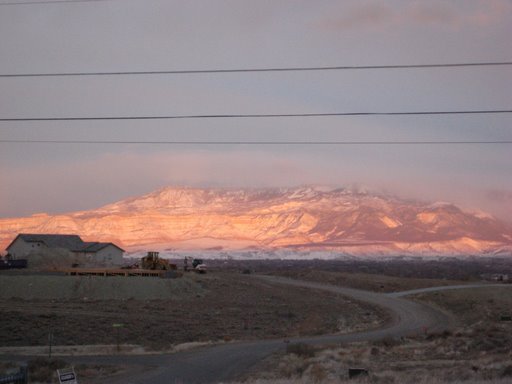Thursday, December 15, 2016
Colorado Solar Industry Sees Rapid Expansion in 2016
Happy Holidays and Best Wishes for A Peaceful 2017… from the Colorado Solar Energy Industries Association.
It’s been quite a year and we hope you can take a break from the tumultuous times and enjoy some rest with family and friends this season. We are grateful for your support which has led to another banner year for solar in Colorado and the nation. Colorado climbed up to 5th among states in installed capacity in the third quarter of 2016, which was solar’s biggest quarter ever nationally. The U.S. installed 4,143 megawatts (MW) of solar PV in the third quarter to reach 35.8 gigawatts (GW) of total installed capacity… enough to power 6.5 million American homes, according to GTM Research.
Early in the year, COSEIA and other solar advocates were deeply concerned about three major proposals from Xcel Energy. More than 200 people joined us to “Stand up for Solar” on the steps of the Capitol. But we spent all summer negotiating with the utility, and the Colorado Public Utilities Commission issued a written order November 23 approving a landmark settlement between Xcel, COSEIA, and nearly two dozen other parties that we believe will provide a good framework for solar growth.
What comes next?
COSEIA is appealing one part of the written order to make clear that distributed renewable energy — beyond the three-year plan in the settlement — will be acquired separately from the pending Electric Resource Plan.
Many provisions of the settlement will take effect early in the new year. Check out our website for summaries of provisions, copies of tariff sheets, a copy of the entire settlement agreement and a copy of the commission’s order.
Some of the provisions are still being worked out. Two new voluntary residential rates will start in a few months after customer education materials are developed… and we will keep you posted. A stakeholder group is still working on hammering out policies for battery storage systems.
Monday, December 12, 2016
San Miguel Power Association, GRID Alternatives, Colorado Energy Office partner on low-income community solar project
San Miguel Power Association (SMPA), GRID Alternatives Colorado (GRID) and the Colorado Energy Office (CEO) today announced the development of a community solar array that will lower the electric bills of qualified low-income residents in SMPA’s service territory. The project is not only part of a statewide initiative to reduce energy costs for utilities’ highest need customers, it is also an effort to turn a limited-use site into a clean energy generator.
With an unwavering vision to reclaim a local landfill, San Miguel County worked with its partners in project development to turn a “brownfield” into a “greenfield” and harness renewable energy that will help the local community for decades to come. Project supporters also include Energy Outreach Colorado, the Telluride Foundation and EcoAction Partners.
According to SMPA Chief Executive Officer Brad Zaporski, the rural electric cooperative has been looking to increase its local renewable energy generation portfolio in a way that makes the resource available to a larger portion of its members and keeps utility bills affordable. Turning an old landfill into a site of local clean renewable energy generation adds an additional layer of benefit to the community and the environment.
“SMPA has long been a leader in energy efficiency and renewable energy,” said SMPA Board President Rube Felicelli. “We are now making home efficiency upgrades and local renewable energy readily available to our lower income members through SMPA’s ‘IQ’ or ‘income-qualified’ Weatherization and Solar Programs. We are excited to join with our partners to reduce our carbon footprint while also reducing the financial burden of high electrical bills on local families in need.”
“When we see projects like this, we are filled with optimism,” said Sandy Stavnes, Acting Assistant Regional Administrator for the Environmental Protection Agency (EPA). “With this project, community partners came together to turn property that had limited reuse potential into something that will provide energy to community members in need as well as significant environmental benefits. A bonus is the solar panels on top of the landfill will assure the landfill cover is maintained.”
This is the sixth low-income community solar demonstration project developed in partnership with local utilities through a $1.2 million grant GRID Alternatives received from CEO in August 2015. Each project is piloting a slight variation on the low-income community solar model to address the unique needs of rural utility service areas and their customers. The projects selected are both affordable and scalable for utility partners and offer great potential to expand across the state.
“This project, with its multiple bottom lines—energy cost saving for families, renewable energy, brownfield reclamation, and local solar job training—is a win for the whole community and a model for the state and the nation,” said Chuck Watkins, Executive Director of GRID Alternatives Colorado.
“This demonstration project with GRID and SMPA reinforces our low cost approach to community solar, which blends the delivery of clean-generated electricity and assisting our neighbors in need,” said Colorado Energy Office Director Jeff Ackermann.
Wednesday, December 7, 2016
Chairman of Colorado Public Utilities Commission to resign
Joshua Epel, chairman of the Colorado Public Utilities Commission, said Tuesday he will resign from the commission effective Jan. 1.
“Joshua Epel has been instrumental in transforming Colorado’s business climate and growing our economy,” Gov. John Hickenlooper said in response. “He helped modernize the state’s regulatory environment with consistency and thoughtfulness, giving Colorado a competitive advantage for any business considering relocating or growing."
Hickenlooper appointed Epel chairman of the PUC in January 2011 and reappointed him in 2014. Prior to that, Epel chaired the Colorado Oil and Gas Conservation Commission, to which he was appointed in 2007.
Epel on Tuesday told the Denver Business Journal that he’d been thinking about stepping down from the PUC for three or four months.
“There are times when you accomplish what you want to accomplish and I feel very comfortable that’s what we’ve done at the PUC,” Epel said. “We’ve had major dockets this year and it’s time to try a new adventure.”
Epel did not say what "new adventure" he has in mind.
The commission oversees the regulation of some aspects of public transportation, such as taxis and ridesharing companies Uber Technologies and Lyft; electricity issues and the state’s two investor-owned utilities, Xcel Energy Inc. (NYSE: XEL) and Black Hills Energy, part of Black Hills Corp. (NYSE: BKH); and telecommunications, including land-line telephone service.
During Epel’s tenure, the PUC oversaw the entry of Uber and Lyft into the Colorado marketplace, and during the last several months has been reviewing Xcel’s multi-pronged effort to update its technology and add more renewable energy.
Epel said the major work done this year by the commission included the PUC’s approval of Xcel’s request to build the 600-megawatt Rush Creek Wind Farm, which will be Colorado’s biggest wind farm, as well as a sweeping settlement involving Xcel and the solar power industry to add more solar power in Colorado, and a decision in November on Black Hills Energy’s request to raise electric rates.
“Commissioner Epel’s service to the state is appreciated. We wish him success in his future endeavors,” Xcel said in a statement Tuesday.
The PUC also reformed state telecom regulations during Epel’s time as chairman. In 2012, it removed state limits on rates that local companies can charge for local landline phone service in areas found to have multiple competing carriers. The changes let the market determine the rates for residential landline service in Front Range cities for the first time.
Epel also championed shifting state subsidies reimbursing telecoms for rural landline service to supporting high-speed internet in underserved rural areas.
Epel serves on the PUC with Glen Vaad, who began his appointment in January 2014 and whose term expires in January 2017, and Frances Koncilja, whom Hickenlooper appointed in January 2016.
Some of the commission meetings have been contentious in recent months, onlookers have said, including one in late November that ended with the PUC cutting Black Hills’ request to raise electricity rates.
Black Hills, which serves customers in southeastern Colorado, had sought an increase of $8.5 million a year.
The commissioners approved a rate increase of less than $2 million a year over complaints from Koncilja, a Denver lawyer and Pueblo native, who wanted more cuts and said the state commission has been too agreeable in past rate requests from the electric utility, according to a story about the decision in the Pueblo Chieftain.
Epel said the conflicts didn’t contribute to his decision to move on.
“You look at what I have accomplished — or we, the group effort at the commission — and there are certain things that I’m proud of, like the decarbonization of the economy, putting on cost-effective renewable energy and cost savings for the state,” he said.
“That is what I set out to do and it’s time to try something different. I’ve been doing this for six years,” Epel said.
John Nielsen, the clean energy program director for Boulder-based Western Resource Advocates, in a statement said Epel had a distinguished career, both in the private and public sector.
“Under his leadership, the Colorado PUC has continued to advance Colorado’s position as a national clean energy leader. Over the course of Chairman Epel’s tenure, Colorado utilities have acquired significant new renewable resources, encouraged thoughtful expansion of the rooftop solar industry, and undertaken significant investments in energy efficiency. We thank him for his service to the state,” Nielsen said.
State Senate President-Elect Kevin Grantham (R-Canon City) said that the Senate's Republicans "will ensure that any new appointee to the Public Utilities Commission is firmly committed to making the well being of Colorado ratepayers their top priority.
"Our most vulnerable citizens and small businesses rely on affordable energy. We also believe the Public Utilities Commission should be prepared to participate as a full partner in a broad regulatory reform agenda moving forward,” Grantham said.
The Senate must confirm the governor's appointee.
Subscribe to:
Posts (Atom)




